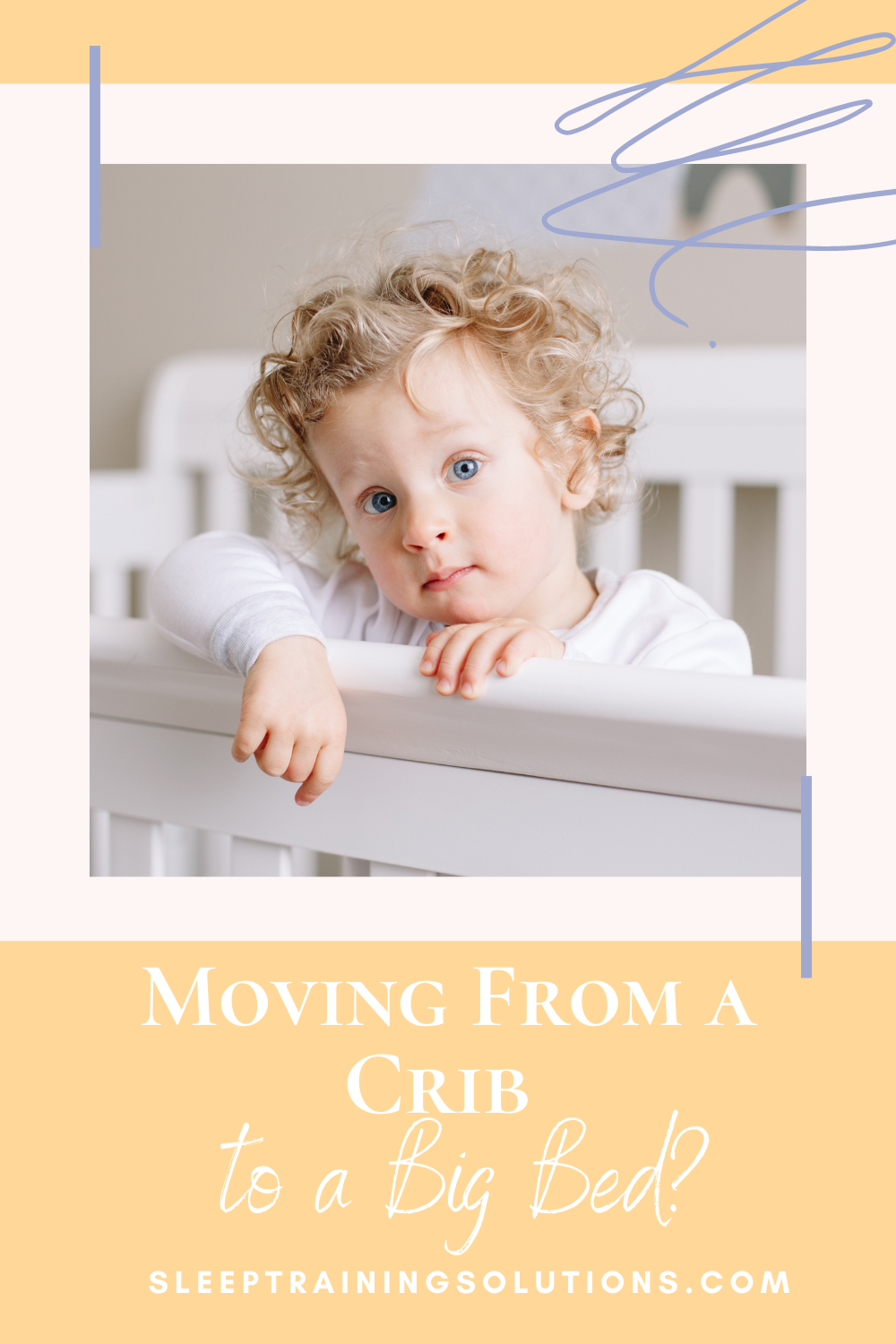Moving From a Crib to a Big Bed?
“When should I move my child out of the crib and into a big bed?” is THE most often question I get from parents of 2 year olds.
Today I’ve talked to moms in California and North Carolina on this very subject!
Here’s what I told them: moving too soon will typically result in a regression – harder bedtime and naptime, night wakings or waking too early.
Kids this age just don’t understand why they can’t get out of bed!
I suggest waiting until at least age 3 to transition to a big bed, and here are 3 reasons WHY:
1. Safety
You watch your child like a hawk during the day…and then give him 12 hours of freedom? Your child’s awake, you’re asleep, and he’s FREE to roam! It doesn’t make too much sense when you think about it that way.
Unless his room is completely childproofed, he could try to climb a bookcase, topple a dresser or become very interested in the electrical outlets. And once he’s out of his room, the stairs become an issue (you never know when he’ll figure out the safety gates – hopefully it isn’t at 2am when you’re snoozing) and he could get into anything (food, chemicals, the knife drawer…the TOILET).
It’s much better to move them when they’re developmental more ready to understand what having that freedom means.
2. Independence
Even if you’ve done your due diligence with childproofing and have thought of everything, giving him that much independence too soon is a recipe for disaster.
Would you leave a bunch of super sized candy bars on the table and walk out of room and expect your child to leave them alone? Um, no. Until children are old enough to understand that too much sugar isn’t good for their bodies, they won’t self control in the snack department.
Same goes for sleep. This is a new experience to have the ability to roam around–especially when the house is quiet and everyone’s sleeping. It’s exciting for your child! Usually you’re setting boundaries for him, but now he doesn’t have anyone telling him what to do! He’ll want to explore or just come and find YOU, which leads us to #3…
3. Creates bad sleep habits
If your child was sleeping well in the crib and now that he’s in a big bed you find his cute little face inches from yours at 3am asking to cuddle with you…well, we both know that’s not good!
When you move a child out of a crib too soon, it practically invites a regression. And especially if you were getting good sleep prior to the transition from crib to the bed, when the night wakings start, you’ll be so tired you may actually cave and let him into your bed…and then it’ll be really hard to move him back to his room.
So what is the single most common concern?
We’re expecting a new baby, so we need the crib.
I get that, BUT if there is less than 2.5 years between the siblings, it would be better to purchase another crib. (Perhaps you could borrow one from a friend or family member or a few months or purchase a relatively inexpensive one.)
But remember that your baby will likely be in a bassinet or pack n play for the first few months, so that might be enough time in your situation.
If your child will be close to 3 when baby arrives, and you are planning on using his crib for the new baby, I would recommend moving him to a big bed 6-8 weeks before baby arrives.
First, you want him to get adjusted to his new bed and have the routine down pat before the craziness starts with the baby. And second, he’ll be less likely to be jealous that the baby is now sleeping in “his” bed.
Just think of it this way, if you move him too soon, you may have a “helper” every time you get up with the new baby…hey, he heard all noise and wanted to see what all the commotion was about! But then you have 2 little ones to get back to sleep!
So my best advice is to wait. Just a little longer. It’s much harder to transition BACK to a crib from the bed if you realize it was a mistake than to keep him in the crib!
Related Posts:
This post is for informational purposes only and may not be the best fit for you, your child and/or your personal situation. It shall not be construed as medical advice. The information and education provided here is not intended or implied to supplement or replace professional medical treatment, advice, and/or diagnosis. Always check with your child’s physician or medical professional before trying or implementing any information read here.





